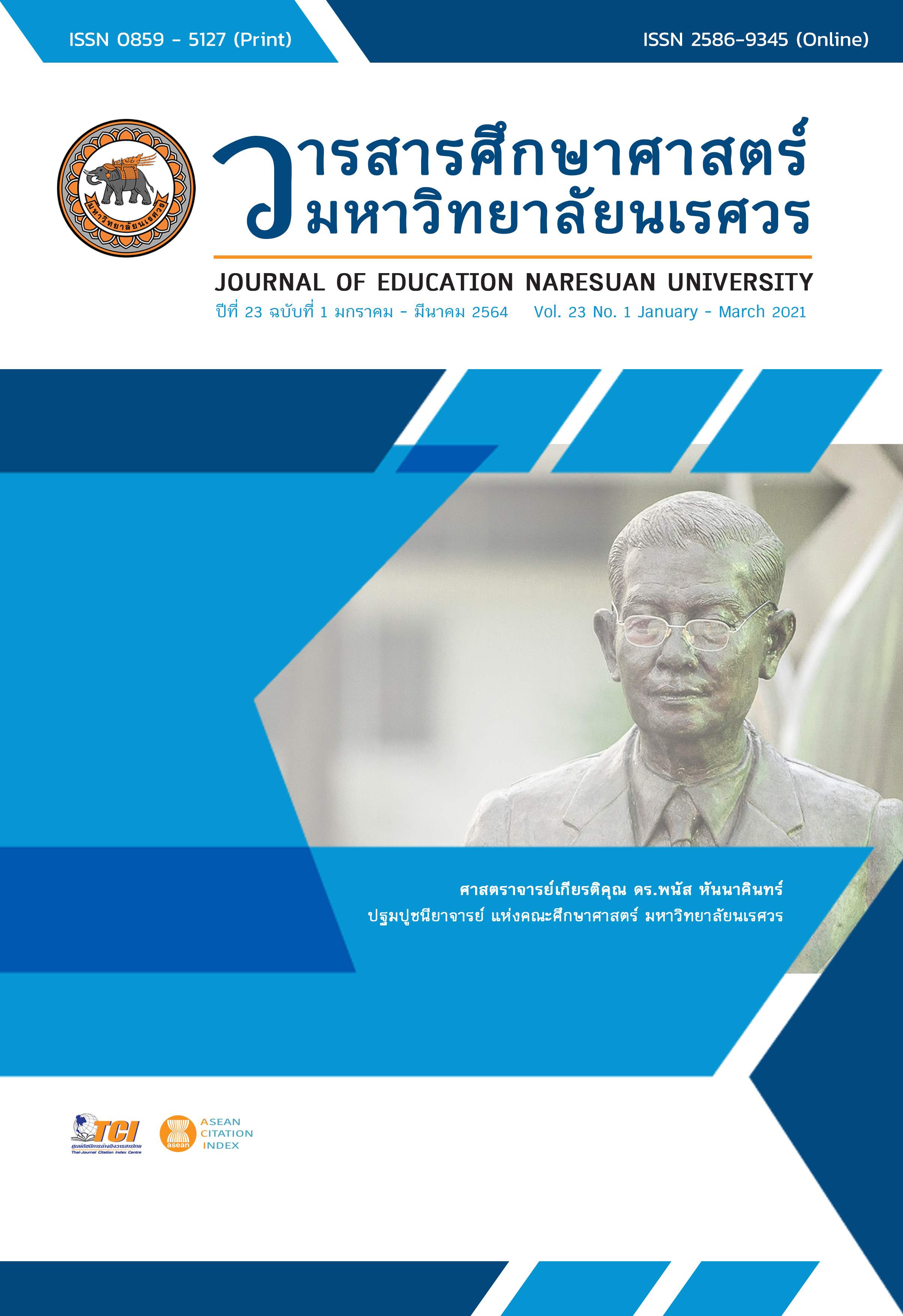A DEVELOPMENT OF SCIENCE ACTIVITY BASED ON INQUIRY METHOD FOCUSES ON INDIVIDUAL DIFFERENCES TO ENHANCE ANALYTICAL THINKING ABILITIES ON STOICHIOMETRY FOR GRADE 10 STUDENTS FOCUSES ON SCIENCE การพัฒนากิจกรรมการเรียนรู้วิทยาศาสตร์แบบสืบเสาะหาความรู้ที่เน้นความแตกต่างระหว่างบุคคลเพื่อส่งเสริมความสามารถในการคิดวิเคราะห์ เรื่อง ปริมาณสารสัมพันธ์ สำหรับนักเรียนชั้นมัธยมศึกษาปีที่ 4 ที่เน้นวิทยาศาสตร์
Main Article Content
Abstract
The purposes of this research was first to construct and study the efficiency of science activity based on inquiry method focuses on individual differences to enhance analytical thinking abilities on stoichiometry for grade 10 students using 75/75 criterion. The second purpose was study analytical thinking abilities after using the activity. The sample used in this research were 39 grade 10 students of science program. The instruments of this research were 1) science activity based on inquiry method focuses on individual differences and 2) analytical thinking test. The data were analyzed using means, standard deviation, and dependent sample t-test. The results of this research study were: 1) activity include of 7 steps as follows: 1.1) elicitation (prepare content readiness), 1.2) engagement (choose your interest), 1.3) exploration (choose your learning profile), 1.4) explanation, 1.5) elaboration, 1.6) evaluation, and 1.7) extension. The suitability of activity had high level ( = 4.42, S.D. = 0.54) and the efficiency of activity had 76.39/75.21 according to 75/75 criterion. 2. The effective implementation was: analytical thinking abilities test result had high level (
= 15.24, S.D. = 0.86) and the student’s analytical thinking abilities after using activity higher than 75 percent criterion at .05 level of statistical significance.
Article Details
The owner of the article does not copy or violate any of its copyright. If any copyright infringement occurs or prosecution, in any case, the Editorial Board is not involved in all the rights to the owner of the article to be performed.
References
Buosonte, R. (2009). Research and development of educational innovation. Bangkok: Kamsamai Printing House. [in Thai]
Eisenkraft, A. (2003). Expanding the 5E Model. The Science Teacher, 70(6), 56–59.
Intamong, K. (2016). The study of biology achievement and scientific analytical thinking by using 7E learning cycle with concept mapping technique on photosynthesis of 11th grade students. Journal of Curriculum and Instruction Sakon Nakhon Rajabhat University, 8(22), 173-185. [in Thai]
Khammani, T. (2012). Science of Teaching: Knowledge for effective learning management (15th ed.). Bangkok: Chulalongkorn University Press. [in Thai]
Kawtrakul, S. (2013). Educational psychology. Bangkok: Chulalongkorn University Press. [in Thai]
Marzano, R. J. (2001). Designing a new taxonomy of educational objectives. California: Corwin Press.
Ministry of Education. (2008). basic educational Core curriculum 2008. Bangkok: The Agricultural Co-Operative Federation of Thailand. [in Thai]
Muakthong, S. (2013). Result of learning activities with inquiry approach on analytical thinking abilities of grade 11 students of secondary area office 5. In Proceedings of 51st Kasetsart University Annual Conference: Education, Economics and Business Administration, Humanities and Social Sciences (pp.79-87). Bangkok: Kasetsart University. [in Thai]
Nuangchalerm, P. (2007). Inquiry Cycle 7 step. Journal Academic, 10(4), 25-30. [in Thai]
Prachanban, P. (2009). Research Methodology in social science. Phitsanulok: Rattanasuwan Printing House. [in Thai]
Rahsanmoung, R. (2010). The effect of science activity bases on Inquiry Cycle (7E) on reaction rate for grade 11 students (Independent Study). Maha Sarakham: Mahasarakham University. [in Thai]
Rodwirat, H., Panprueksa, K., & Chaiprasert, P. (2018). The effect of 7E learning cycle with STAD technique on learning achievement, analytical thinking, and attitude towards chemistry of grade 10 students. Journal of education Naresuan University, 20(3), 238-250. [in Thai]
Sankaburanurak, A., & Sankaburanurak, S. (2014). Differentiated Instruction. Journal of Education Silpakorn University, 12(1,2), 39-48.
Tomlinson, C. A. (2001). How to differentiate instruction in mixed-ability classroom (2nd ed.). Upper Saddle River, NJ: Prentice Hall.
Tomlinson, C. A. (2010). Differentiated and brain: How neuroscience supports the learner-friendly classroom. Bloomington, IN: Solution Tree Press.
Wongket, J. (2017). The development of learning activities using inquiry approach together with mind mapping techniques to promote analytical thinking abilities on one-variable linear equation for mathayomsuksa 1 students (Master thesis). Phitsanulok: Naresuan University. [in Thai]


